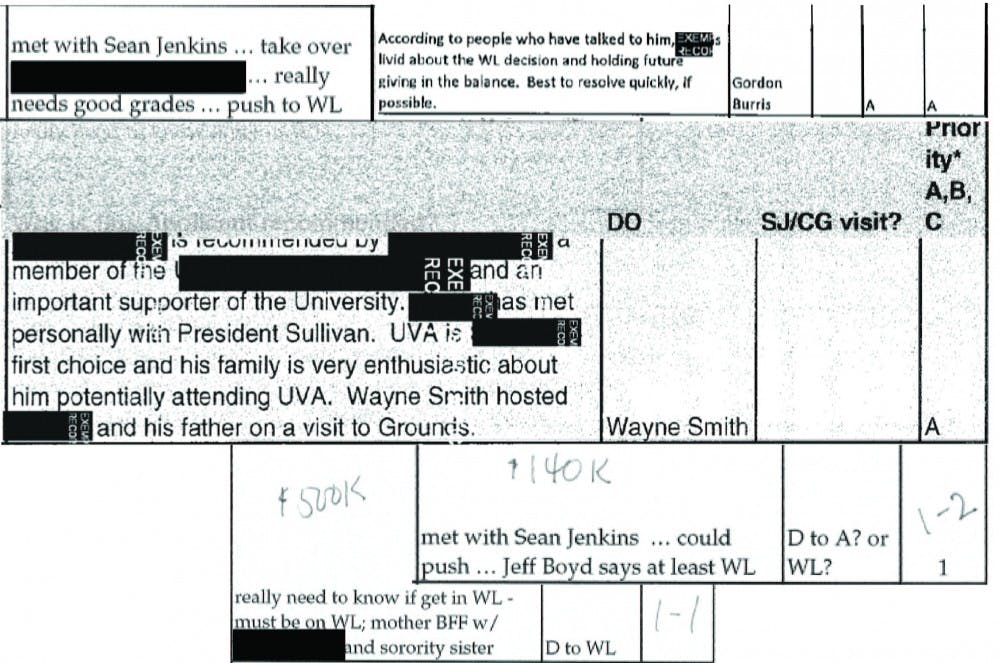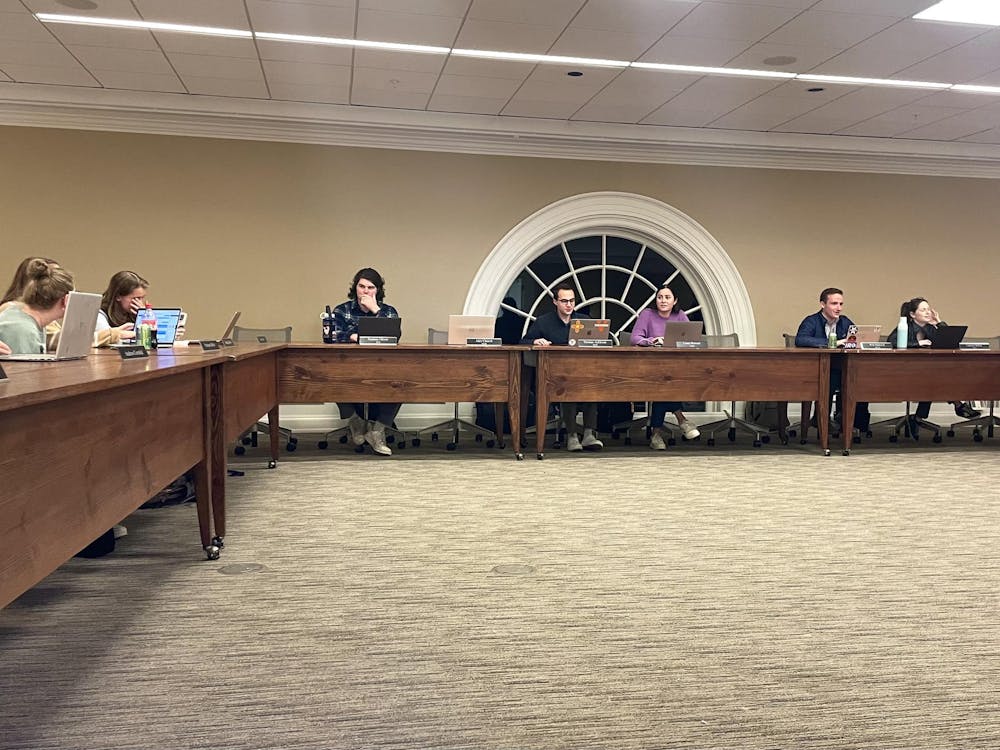According to documents obtained by The Cavalier Daily, the University has used a “heads-up list” for applicants connected to major donors in recent years, although the University’s financial aid website states “we accept students solely on their academic merit.”
The documents reveal changes in application status and that some applicants met with University officials, likely due to connections with donation amounts.
The Cavalier Daily obtained the documents through author Jeff Thomas, who used the Freedom of Information Act to look into “development” or “VIP” applications tracked by the Office of the Vice President for Advancement. Thomas had requested the documents for research for his book, “Virginia Politics & Government in a New Century: The Price of Power.”
According to Thomas’ allegations, the University secretly accepted “bribes” for admission.
“Any applicant has the potential to be screened through this process, but only about 0.2 percent had daddies wealthy enough to be included in these lists, to the detriment of all other applicants — especially those qualified students whose spots they ended up taking,” Thomas said in an email to The Cavalier Daily on Sunday.
According to University spokesperson Anthony de Bruyn, the advancement office receives “periodic” updates on certain applicants’ admission statuses throughout the admissions process, but the admissions and advancement offices do not have access to each other’s records.
“The Advancement Office does not determine whether an applicant is admitted,” de Bruyn said in a statement. “Admission decisions are determined solely by the professional staff within the Admission Office. This practice allows development officers to serve as a buffer with those alumni, donors and friends who have provided prospective student endorsements during the admission cycle.”
However, documents show there were efforts to improve an applicant’s status based on the amount of money donated to the University. In one instance, an applicant who was originally denied, had a handwritten note of “$500K” next to their name. This applicant’s status was either suggested to be moved to or was moved to the waitlist.
Another applicant, who was noted with a donation amount of “$140K,” also had a note stating Jeff Boyd, the director of the University Parents Fund, “says at least [waitlist].” It was unclear if the applicant’s status was updated to accepted or waitlisted.
“[The handwritten notes] show that taxpayer and tuition money has paid for a secret financial intelligence apparatus in which familial wealth or influence gives unqualified students an admissions advantage,” Thomas said.
The notes of one applicant who was waitlisted show the connected donor was “livid” and “holding future giving in the balance,” and the situation was “best to resolve quickly, if possible.” The documents, however, do not show if the applicant was eventually offered admission.
Documents also show employees of the advancement office were assigned to specific applicants with alumni parents, often marked with a level of priority of A, B or C.
According to de Bruyn, the practice of donors contacting the advancement office to recommend students and the office’s subsequent updates on an applicant’s status is prevalent in many other universities.
“One of the primary duties of development officers at the University is to foster and maintain relationships with alumni and donors,” de Bruyn said. “As part of this relationship building, development officers catalog these inquiries.”
In addition, the documents show that some of the applicants tracked by the advancement offices had meetings with University officials. University President Teresa Sullivan was shown to have met with one applicant who was “recommended by [an] important U.Va. supporter.” The applicant, who applied early action, was waitlisted according to the documents.
A separate applicant, who also met with Sullivan, was noted as being affiliated with “an important supporter of the University” and was hosted by former Athletic Capital Campaign Executive Director Wayne Smith during a visit to Grounds. It is unclear whether the student was admitted to the University, but the student was noted as a “Priority A” student.
According to the documents, some applicants met with Senior Assistant to the University President Sean Jenkins. One applicant for the class of 2015, who was an out-of-state non-legacy student, was noted as having met with Jenkins. The advancement office noted it “could push [the applicant’s status] if priority.” However, an applicant in the same pool, who was also an out-of-state non-legacy student, but did not meet with Jenkins, had a note that read, “would have to know if U.Va. [was their first] choice” and a subsequent note confirming the University was the applicant’s first choice.
Another applicant for the class of 2015 was originally denied, but had a note that said, “SJ pushing for WL.” This applicant’s status was then either suggested to be moved or was moved from denied to the waitlist.
The advancement office also referenced the practice of suggesting “courtesy” waitlist decisions for referred applicants. One out-of-state non-legacy applicant in particular was noted as a “real reach” for admission and was either suggested to be granted or was granted a “courtesy [waitlist]” decision. A different applicant was noted as “[denied] very low, could try for courtesy [waitlist] if important.”
The documents also reference two separate applicants who had ties to Board of Visitors members at other universities. One applicant had a handwritten note which said “W&M [William & Mary] BOV” while another said “dad on [Board] at Ole Miss.” Both applicants were accepted to the University.
The names of University students and donors were redacted throughout the documents.
View the documents obtained in Jeff Thomas's Freedom of Information Act request HERE.





